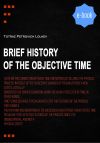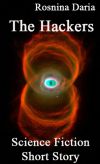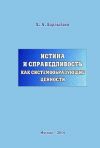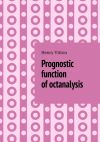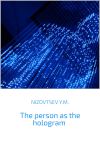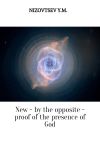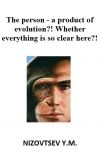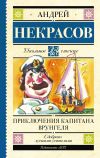Текст книги "Everything and nothingness"
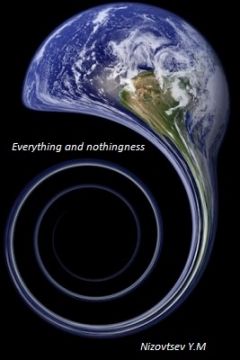
Автор книги: Юрий Низовцев
Жанр: Философия, Наука и Образование
Возрастные ограничения: +12
сообщить о неприемлемом содержимом
Текущая страница: 2 (всего у книги 12 страниц) [доступный отрывок для чтения: 3 страниц]
Truth is equivalent of beingness to consciousness in experience, confirmed in every case by successes of consciousness in the use of beingness, exactly by this condition truth is determined and goes to the existence. Therefore truth corresponds to a level of development of consciousness and in this sense it is relative and truth can actually be equated to essence of a certain level and conditions of beingness in which it is comprehended.
Numerous definitions of concept of truth affects only its separate sides, but doesn't penetrate into its sense. inasmuch classical definition of truth, in which the main criterion of truth is identity of thinking and beingness, rests against the fuzzy concepts "thinking" and "beingness" which yet should be brought into accord somehow.
Nevertheless, to truth anyway only consciousness can come, "having looked" at itself, at the surrounding and, further selecting subjects, to try to bring into accord with own intentions these subjects, most likely, changing them in own highest expression, than adapting of yourself under them.
Therefore truth in the course of cognition is always specific and depends on the level of knowledge and ability to put them, i.e. it is checked by practice, as a rule, and only limited is checked by favor so how seeming pragmatically superfluous and even unwanted for this moment of knowledge and skills can "flip" the world in the sequel, whereas the aspiration to benefit, to satisfaction of the desires, determined only by conviction (belief) is downfall of the person up to level of "consumption" only the useful that is similar to the animal adaptation to the environment instead of its conversion, and it leads eventually to degradation of the person. So that Pierce too narrows concept of truth: "A true proposition is a proposition belief in which would never lead to such disappointment so long as the proposition is not understood otherwise than it was intended” [6, p.242-257].
Another definition of "the father" of pragmatism Peirce pertaining to truth: “Consider what effects that might conceivably have practical bearings you conceive the object of your conception to have. Then your conception of those effects is the WHOLE of your conception of the object” [7, p. 331-346] proposes to take into account all "conceivably practical”.
Here, too, it appears a insufficiency of two types: the practical today may seem by one circle of things, tomorrow – another, that introduces uncertainty in the concept of the object, which also can be seen from an unexpected quarter – so appear inventions; besides, the practical is nevertheless mostly the useful, the utilitarian, excluding imagination, flight of thought, "mad" ideas, which are capable to change radically our life, and really changed it, especially for the last decades.
Truth in accordance with the growth of knowledge and practical application changes its appearance so how human consciousness goes from essences of one level to essences which are deeper. And in this sense truth corresponds to essences revealed.
Here it is possible to agree with Lenin V. I., which declared: “For the materialist the “success” of human practice proves the correspondence between our ideas and the objective nature of the things we perceive” [1, chapter 1.2]; with the amendment that "the objective nature of things," initially no, because things, which are independent of consciousness, are not exist – all of them, or rather their copies are formed by consciousness in accordance with its form-building capabilities and these copies are "given" to a person for his life and development, in the course of which evolves and changes his consciousness itself, which acquires a "transient" independence in each life of individual consciousness. Therefore, only for a individual consciousness in the person, which is "clipped" one-sided from the single consciousness, all things become independent of him during his lifetime, acquiring still and motion, change precisely in order that he could overcome the resistance of the medium out of things and other people with their own individual consciousnesses competing with him and could "compel" things to "obey" to him.
Except of the practice the stability can be criterion of truth. The stability is expressed in a number of logical deductions, virtually no checking, but based on known laws.
One cannot deny touch to truth of and by means of intuition, i.e. as the process of finding truth without the intermediate steps from the first principle to whom may be just aught appearing, inasmuch human consciousness cannot penetrate into "space" from where is taken all, that appear.
Hobbes and Berkeley till Husserl have understood this situation with the relation of sensations (consciousness) and things.
Hobbes detaches sensations with all their derivatives from objects, generating in us sensations: “And though at some certain distance, the real and very object seem invested with the fancy it begets in us; yet still the object is one thing, the image or fancy is another” [8, p. 1-2].
Separation by Thomas Hobbes sensations and objects, in essence, was the basis for the ideas of Berkeley, consisting in the fact that without existence of senses and reason existence of everything else is problematic, because nothing and no one perceive it.
Berkeley believes existence of things only due to their perception by the human mind, or his soul, inasmuch there is no evidence of separate existence of things outside human sensations: “XXIII. But say you, surely there is nothing easier than to imagine Trees, for instance, in a Park, or Books existing in a Closet, and no Body by to perceive them, I answer, you may so, there is no difficulty in it: But what is all this, I beseech you, more than framing in your Mind certain ideas which you call Books and Trees, and the same time omitting to frame the Idea of any one that may perceive them? But do not you your self perceive or think of them all the while? This therefore is nothing to the purpose: It only shews you have the Power of imagining or forming Ideas in your Mind; but it doth not shew that you can conceive it possible, the Objects of your Thought may exist without the Mind: To make out this, it is necessary that you conceive them exist unconceived or unthought of, which is a manifest Repugnancy” [9, p. 18].
To the extreme, like Berkeley, Husserl does not come, but he joins to Hobbes and Berkeley in the thought, that meditation of the primary source, or the appearing, is the true source of knowing: “No conceivable theory can make us err with respect to the principle of all principles: that every originary presentive intuition is a legitimizing source of cognition, that everything originarily (so to speak, in its “personal” actuality) offered to us in “intuition” is to be accepted as what it is presented as being but also only within the limits in which it is presented there. We see indeed that each theory can only again draw its truth itself from originary data. Every statement which does no more than confer expression on such data by simple explication and by means of significations precisely conforming to them is, as we said at the beginning of this chapter actually an absolute beginning called upon to serve as a foundation a principium in the genuine sense of the word” [10, p. 44].
Along with that Husserl, in fact, if truth is adequate to what we call essence, considers that truth is unattainable in full, i.e. as the absolute: “The specific character of certain categories essences is such that essences belonging to them can be given only “onesidedly”, in a sequence “many-sidedly”, yet never “all– sidedly”” [10, p. 8].
Hume treats truth as compliance of thinking to sensations of the person: “We perceive only properties of those forces which are available to senses" [11, p. 22]; “They are the successive perceptions only, that constitute the mind; nor have we the most distant notion of in place, where these scenes are represented, or of the materials, of which it is composed” [11, p. 253].
In its considerations Hume accurately catches that circumstance that primordial source of Whole for human consciousness are namely sensations. In this respect he is quite right, because it is through the senses information comes into control centers of consciousness of the person. Hume also is right in his doubt about existence and qualities of the things which are beyond the senses. Here he is certainly consistent in their views and findings, and differs from other thinkers in that does not take the responsibility to determine aught unknown to him, to speculate on the basis which is impenetrable for him.
However, Hume, like most of thinkers, concentrates the attention not on consciousness, and on the person, and this circumstance, naturally, leads him to not quite adequate conclusions: "… on what base we should think that the same forces will be always combined with the same felt qualities. Therefore, the principal in life is not the mind, but a habit. Only it forces mind in all cases to assume that the future corresponds to the past. How easy did not seem this step, mind never for all eternity would not be able to make it" [11, p. 22]
One can hardly argue with Hume that experience, the habit generated on its basis that is an important factor in human life, the more that Hume rightly pointed out existence of many unknown to us Forces that involves for the person a support preferably on known and clear to him.
Nevertheless, here Hume pulls together the highest consciousness inherent in the person, with the lowest consciousness, belonging to the living beings without self-consciousness. The living beings without self-consciousness really only adapts to the environment by trial and error, accumulating over many generations of genetic memory that allows them to coexist satisfactorily with the environment and to struggle with competitors on the basis of accumulated experiences and genetic memory. But all this doesn't allow living beings without self-consciousness to raise above the environment – in a result, essential change of the environment leads to death of the whole types.
In contrast to the lower consciousness of the living beings without self-consciousness, the higher consciousness of the person is characterized primarily not by mind, which is inherent in all living things in one form or another as centers that process information, incoming from sensations, but by awareness of yourself itself, which implies not just the adoption of the information from sensations and more or less adequate reaction to it, but and the subsequent conscious change of everything that manifests before him and in him.
For this purpose the consciousness in the person has a set of means: imagination, extensive databases, human interaction, intellection of all its forms, purposeful skilled verification of the arriving information, formulation and consolidation of regularities, deduced on the basis of experience and logical processing of information, aspirations for the new, the unknown, producing upheavals in life on the basis of inventions and utilization of fundamental discoveries, etc.
Therefore the habit characteristic only for the layman, who muffles aspirations of own consciousness to the unknown, who prefers to live within already the tested, but not for not strangled consciousness, who always seeks to overcome any circumstances at any cost.
Following Berkeley, Avenarius, denying existence independent of human consciousness reality, believes in this regard that truth is not compliance of consciousness to objective reality, but it is a result of coincidence of the perception of the majority, consistency of data, aspiration to integrity of system of data or as the coherence of sensations: “Here we only noted aspiration for a higher unity, because in it lurks the aspiration to think in the concept of a coherent whole. We could note this fact and on dualism, so as after all its division of the world into two opposites testifies to the thinking, which is addressed to integer; but we thought that the aspiration to finite, higher unity better expresses the need thinking of the totality of things, as understood" [3, §39]; “The final result of our analysis concurs—although not absolutely (durchgehend) in the measure of the various points of view—with that reached by other investigators…” [12, p. 120].
Hegel also joins the aforementioned thinkers in relation to the absolute truth. If we recall the definition of the absolute, which has gave Hegel, namely: “The absolute is the unity of subjective and objective … whereas in fact subjective and objective after all not only are identical but also different” [13, p. 116], then the absolute neither in the current life, nor in thinking can't be.
In terms of the interaction of consciousness and things, identified by consciousness, process of deepening of consciousness in the thing depends on the level of consciousness, which can understand the essence of thing only in accordance with it, moving ahead, for example, from the general concepts "heat" and "cold" to laws of molecular motion in different environments.
Therefore it is inadequate to consider that each step in the knowledge is the absolute truth, moreover it is possible to go deep into the thing infinitely not only because nobody knows its depth but also because consciousness itself changes "jumping" from one level of development on another where things appear before him in other appearance and obey to other regularities.
Perhaps that is why the oldest religion on Earth – Hinduism – stated: truth cannot be expressed because of its diversity.
And contemplative in its essence Buddhism, by contrast, thought that truth is revealed in front of each of your gaze.
It was shown above how difficult to object to both.
Be that as it may, but practical advance of mankind both in technical, and in moral the relations show that coincidence of aspirations of people with cognizable by them to the main natural and public regularities in refraction them to the solution of practical tasks lead actions of people to real achievements. Means, truth nevertheless exists!?
But really truth has only relative, banal or pragmatic character? Perhaps, there is aught beyond the current reality which nevertheless can be understood intuitively and added to the few fundamental truths.
It seems that to approach to decision of this problem is only possible due to clarify the correlation of such categories as beingness, consciousness, information.
1.2. The active and the passive in the unity and a division
Beingness in the usual formulation is existence of things. However in our opinion, this understanding is not enough, because to explain this existence as a separate is impossible.
Therefore God arises inevitably for some – divine source and the prime propulsor of these things (the real).
The opposite camp as opposed to this view puts forward a hypothesis of self-development of matter.
Both aren't represented by satisfactory interpretations of existence of the real.
As for God, this omnipotent, live, external and infinite being is so contradictory and fantastic, that it is only possible to believe in him from hopelessness, that and happening. More in details on these and other properties of God we will stop below.
If to present matter in the form of some formation which itself moves and always was in motion, and in this motion it forms else, including consciousness, then, firstly, if to prove that motion is visibility, or rather, motion is secondarily, appearing only owing to technical transformation of process of updating of copies of things in consciousness of living beings in motion, then self-development of a matter does not exist. Secondly, it has long been proven, that the genome of any living being is so complex that a self-assembly, self-development is impossible for it. However, the living beings exist and there are even the living beings, conscious of themselves, i.e. the people themselves. Thirdly, inasmuch it is recognized that self-development is the ongoing progressive process, then it must have initial and final conditions.
All it means that thinkers of all ages have underestimated the complexity and ambiguity of the next factor: who we – the people – such in truth, as well as in what we are situated.
However, Parmenides tried to prove that beingness is one thing, that there is no motion in it , there is no origination and destruction: “… it is universal, existing alone, immovable and without end; nor ever was it nor will it be, since it now is, all together, one, and continuous” [14, p. 37-39]. Regarding the world in which we are, then he put it so: “It is necessary to say and to think that What Is is; for it is to be,/ but nothing it is not. These things I bid you ponder./ For I shall begin for you from this first way of inquiry,/ then yet again from that along which mortals who know nothing/ wander two-headed: for haplessness in their/ breasts directs wandering understanding. They are borne along/ deaf and blind at once, bedazzled, undiscriminating hordes,/ who have supposed that it is and is not the same/ and not the same; but the path of all these turns back on itself” [14, p. 37-39]. That is, he believes this world is the seeming world of opinions and senses.
It is necessary to tell that Parmenides's idea about beingness as the uniform, the eternal and the motionless, which seems absurd, actually can explain a lot of things in existence, if to assume that the except eternal, infinite Uniform there is not seeming, but quite the material, real world in time which is united indissolubly with the eternal Uniform in a certain sustainable system, both components which support each other.
To assume this, of course, possible, but it would be desirable to receive the answer to a question: how functions this system.
Beingness, if to see under it everything existing, or existing things, can't be manifested in absence of consciousness in any way. In other words, if the consciousness was not, as such, then and beingness there would not be – there would be nothing. This fact is, apparently, the primary cause of the appearance in human consciousness of the concept of God-creator.
The first of philosophers this ratio between consciousness and things quite distinctly, albeit in his own way, understood Berkeley: “IV. It is indeed an Opinion strangely prevailing amongst Men, hat Houses, Mountains, Rivers, and in a word all sensible Objects have an Existence Natural or Real, distinct from their being perceived by the Understanding. But with how great an Assurance and Acquiescence soever this principle may be entertained in the World; yet whoever shall find in his Heart to call it in Question, may, if I mistake not, perceive it to involve a manifest Contradiction. For what are the forementioned Objects but the things we perceive by Sense, and what do we perceive besides our own Ideas or Sensations; and is it not plainly repugnant that any one of these or any Combination of them should exist unperceived?” [9, p. 13].
In this statement of Berkeley traced the idea that without existence of senses and reason is problematic existence of everything else, inasmuch there are no one and nothing to perceive the rest. However, Berkeley out of this draws the conclusion, characteristic for his time: “XXVI. … there is no corporeal or material Substance: it remains therefore that the Cause of Ideas is an incorporeal active Substance or Spirit” [9, p. 19].
Whatever it was, but Berkeley is correct in his assumption that without consciousness the world does not exist, it simply cannot be as beingness: in this case the world is already non-existence, nothingness.
Our own existence means that a contradiction is in the infinite and eternal Uniform, as a result of which it, remaining uniform, infinite and timeless, along with that is discretely in infinite number of finite worlds, acquiring time of existence.
Otherwise, Uniform would have remained in non-existence. This means that infinite and timeless Uniform potentially contains all, including at least aught the passive and aught the active which are able to exist as the projection of Uniform into time, i.e. in finite changes. Question consists only in the mechanism providing this duality: in Uniform potentially there is everything and along with that Uniform is nothingness, inasmuch separately it is non-existence. On the other hand, there is its twin, or a projection in which there is time. In other words, Creation (system of a world order) is the infinite timeless Uniform, and along with that – aught the finite, manifesting itself in time infinitely that we designate as beingness, or existing things in its last embodiment, perceived by us as the real.
The fact that some "mechanism" of manifestation of the world in the form known to us exists one can hardly deny, and most simple its realization is power of God, or power of the spirit.
Such conclusion did Berkeley, who considered possible existence of only the incorporeal, the spiritual.
However the incorporeal is non-being, which must stay in it owing to impossibility of emergence in this "Nothingness" of internal contradictions with their exit "outwards" – in beingness. We observe quite real picture of the world, and the things, which are in it, aren't incorporeal, on the one hand, at this, consciousness, on the other hand, interacting, in particular, with a body, despite own elusiveness, is quite effective and material force which is reflected in the psyche and transformation of sensations into constantly shifting picture of the world.
Husserl, investigating consciousness in its ratio with beingness, despite different fluctuations, ultimately, like Berkeley, acknowledged the possibility of existence of only consciousness even if the whole world will disappear: “Consequently, no real being, no being which is presented and legitimated in consciousness by appearances is necessary to the being of consciousness itself (in the broadest sense, the stream of mental processes)” [10, p. 110].
Avenarius and Mach prove that without consciousness there is no matter, and without matter there is no consciousness so how in experiment distinction between subject and object disappears. On this basis they deny existence out of the person of objective reality.
V. I. Lenin, as a materialist, has put forward against this approach the following objections.
“For every scientist who has not been led astray by professorial philosophy, as well as for every materialist, sensation is indeed the direct connection between consciousness and the external world; it is the transformation of the energy of external excitation into a state of consciousness. This transformation has been, and is, observed by each of us a million times on every hand. The sophism of idealist philosophy consist in the fact that is regards sensation as being not the connection between consciousness and the external world, but a fence, a wall, separated consciousness from the external world – not an image of the external phenomenon corresponding to the sensation, but as the “sole entity.” Avenarius gave but a slightly changed form to this old sophism, which had been already worn threadbare by Bishop Berkley. Since we do not yet know all the conditions of the connection we are constantly observing between sensation and matter organized in a definite way, let us therefore acknowledge the existence of sensation alone – that is the sophism of Avenarius reduces itself to” [1, chapter 1.1]; “The existence of matter does not depend on sensation. Matter is primary. Sensation, thought, consciousness are the supreme product of matter organized in a particular way” [1, chapter 1.2].
In response to this statement of Lenin V. I., we will notice the following.
The person, the lizard, the spider perceive in their own way the same thing and use it accordingly. In some cases, the thing, which is perceived by the person, is unavailable to the worm, not passing through the channels of his sensations, or this thing is felt by the worm completely in a different form and properties. That is, the worm has some own environment, own world anyway and the person isn't able to get into it, and vice versa. In other words, sense organs of various beings form their own environment not from "ready" things, but form it in compliance only with those means which they possess. Therefore the "form" of the thing, which emerges in consciousness of any living being, depends on its sense organs, but not from matter "on the other side" from sensations.
Thus, paramount to the living being in correlation with a thing has process of identification of a thing by means of scanning the surrounding with sense organs as well as existence in individual consciousness though the hidden, but accurately acting form-building abilities, or matrices, which correspond to the capabilities of sense organs of the living being. At this the sense organs on a set and on properties differ significantly for living creatures. For example, birds perceive the magnetic field and they are even able easy to navigate by it, the person does not have this ability. However he was able to understand its nature by expanding the range of their sensations artificially -in this his difference from other living beings, – the person using appropriate instruments, discovered the magnetic field, determined its essence, and then began to use it in own practice.
However no devices cannot penetrate the essence of the "dark matter" and cannot help to the person to reach other measurements of the Universe.
Whatever it was, but the sphere of the surrounding different species of living beings – their own, and this sphere depends on opportunities of their sense organs and to the hidden form-building abilities corresponding to them, which are determined not by individual consciousness in its open expression, but at means of the single consciousness. But for the person the form-building abilities of consciousness partially are discovered also in his ability to revealing by these or those ways of essences of things on the basis of experiment and own intelligence.
Thus, if sense organs and a certain reflective-instinctive mind of the living beings without self-consciousness develops only during evolution, at the person they is supplemented with various instruments of labor, devices, apparatus as well as thinking with elements of analytical and synthetic intellectual actions, imagination, communication language, extensive and databases, replenished all the time, aspirations to new etc., that allows him to create culture, a civilization, to carry out practical incessant process of knowing the world, as well as to improve conditions of own existence; as Heidegger spoke, the person "takes care" of beingness, without forgetting about himself: “The multiplicity of these is indicated by the following examples: having to do with something, producing something, attending to something and looking after it, making use of something, giving something up and letting it go, undertaking, accomplishing, evincing, interrogating, considering, discussing, determining… All these ways of Being-in have concern as their kind of Being – a kind of Being which we have yet to characterize in detail. Leaving undone, neglecting, renouncing, taking a rest – these too are ways of concern; but these are all deficient modes, in which the possibilities of concern are kept to a “bare minimum”. The term “concern” has, in the first instance, its colloquial [vorwissenschaftliche] signification, and can mean to carry out something, to get it done [erledigen], to “straighten it out”. It can also mean to “provide oneself with something”. We use the expression with still another characteristic turn of phrase when we say “I am concerned for the success of the undertaking.” Here “concern” means something like apprehensiveness. In contrast to these colloquial ontical significations, the expression “concern” will be used in the investigation as an ontological term for an existentiale, and will designate the Being of a possible way of Being-in-the world. This term has been chosen not because Dasein happens to be proximally and to a large extent “practical” and economic, but because the Being of Dasein itself is to be made visible as care” [4, p. 83-84].
Thereby awareness by the person of himself gives him opportunity in the course of the practical actions and the subsequent reflection (and vice versa) to find essence, stability of things in their changes, but it happens only on the basis of what the person feels without opportunity to penetrate into the world, which is felt by other living beings, as well as without opportunity to penetrate beyond their own sensations, even expanded with devices, in particular, to get into own hidden consciousness (the subconscious mind), distant worlds, other measurements.
Therefore argument of materialists, including V. I. Lenin, that practice is the only criterion of truth during knowledge of objectively existing things that is everything that exists outside sensations (this ultraboundary Lenin V. I. calls matter) which connect consciousness of the person with the outside world, may not be adequate. This criterion is valid, as we have shown above, only applied to the current life, but not for the entire multifaceted beingness, and, in particular, to prove the presence of things in such form how we perceive them, or lack of things outside sensations is impossible with all certainty.
In this regard, neither materialists, represented by V. I. Lenin in his assertion about the existence of matter as primary and not depending of sensations, nor empirio-critics, represented by Avenarius and Mach, which asserted the primacy and somewhere the uniqueness of sensations, can't apply for the ultimate truth, so how don't represent adequate ratio of beingness, consciousness and information.
- ВКонтакте
- РћРТвЂВВВВВВВВнокласснРСвЂВВВВВВВВРєРСвЂВВВВВВВВ
- Telegram
- Viber
Правообладателям!
Данное произведение размещено по согласованию с ООО "ЛитРес" (20% исходного текста). Если размещение книги нарушает чьи-либо права, то сообщите об этом.Читателям!
Оплатили, но не знаете что делать дальше?